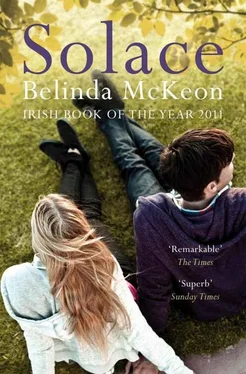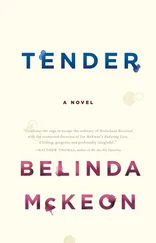‘Look at this one, what she’s at,’ Tom called to him, pointing to the Charolais.
Lynch squinted over at the heifer. ‘She’s calving?’ he said, in surprise. Tom nodded.
‘She has the right idea,’ Lynch laughed, and he started towards her. ‘More for her new master. Come on.’
Tom looked at him. ‘Sure you’ll leave her here for today itself?’ he said, as Lynch swiped at the heifer’s hind legs.
‘I’ll have her up at my own place before she gets too much further into it,’ Lynch said. ‘Sure it’s only a couple of miles.’
‘You’ll leave her here for to calve, at least?’ Tom tried again, and when he heard the plea in his own voice, he took his stick and hit the heifer more sharply than Lynch himself had. She staggered towards the trailer.
Lynch stilled her, moving her slowly and carefully on to the ridged ramp and into the trailer. ‘That’s it,’ he said, in a low voice. ‘Good girl now. That’s it.’
The heifer stood uncertainly on the trailer’s edge, still trying to keep apart from the crush of animals jolting and mounting each other in the small space, each of them staring to the side in the same frightened way. Knees buckled and necks lengthened, but there was barely room enough, even, for a tail to swish at a fly.
‘She’ll be all right,’ Lynch said, turning to Tom. ‘She has a couple of hours to go yet.’
‘That lane,’ Tom began, but he stopped himself.
Lynch needed a hand to raise the ramp and shut the trailer on the animals. ‘Good suspension on this yoke,’ Lynch said, gesturing to the trailer wheels. ‘She won’t feel a thing.’ He dug in his pocket and took out an envelope thick with the burnished brown of fifties. ‘Now,’ he said as he handed Tom the wad, ‘nothing left to worry about, only how to spend it.’
He climbed into the cab and was gone, the trailer jangling over the rocky surface, the yard ringing with the bellows of the heifers. Tom followed him down the lane as far as the house, watching the dust risen by his wheels.
At first it had been strange not having the herd, but in truth the shape of Tom’s day changed very little. He walked the farm as much as he had before Lynch took the cattle; some weeks, he walked it more. He still started out in the lower fields, testing the ground, checking the bog holes, examining the fences. Then he would walk back up the lane and past the house to the yard where the calves had been housed until they were old enough to be let out to grass, and where the yearlings had pucked and chased one another through the long garden. He would look into each of the sheds and then, setting the radio going in the old Massey, he would work for a few hours at something in the small shed he had years ago turned into a workshop for himself and Mark; he would hammer at something, do something up, make something that would be useful in the yard. Before, there had always been a chainsaw or a hedge-trimmer to fix for someone, but nowadays hardly anyone left them in; it might have been that they were buying new ones instead of getting them repaired, but Tom knew it was more likely that people still thought it was too soon to ask him to do a favour for them, to do a job. And yet nothing could have been further from the truth. If he could have found fault with his own chainsaw or trimmer, he would have taken them apart just for the pleasure of dismantling them and finding the problem, putting it right, piecing the whole lot neatly back together again, but they were running perfectly. The saw went through wood like water. The trimmer put a shape on ditches that would nearly win you a prize. Only the old Massey was giving problems, the clutch worn down again, the gearbox sticking badly, the lift losing strength. It was on a wet morning, wrestling in the tiny cab to open up the floor and get at the gears, banging his head and his elbows every time he budged, that Tom cursed and thrashed and twisted his way towards the decision that landed him in Brady’s showroom two days later. In his coat pocket were Lynch’s envelope of cash and a cheque written on the savings account he had had with Maura.
So Frankie Lynch had done him a favour. But Mark would not see it that way. Mark would only see it in his own way: childish and suspicious and wild. It shocked Tom how far from calm in himself Mark still was. He had come on nothing at all since the summer. Standing there tonight, with the receipt from the sale in his hand, he had been like a young lad in a tantrum. Sense had needed to be talked into him. Now, half an hour later, Tom knew he had gone too far with some of what he had said to Mark; with what he had said, especially, about Joanne. It had not been fair; it had not been true. But it had seemed as though only strong words would force Mark to face up to the facts of how things really were. And it was not as though the things Mark himself had come out with were fair or true. No father should ever have to hear such words from his son.
Tom knew where Mark was gone, and he knew he should be worried. But he could not bring himself to worry. He could hardly bring himself to care. He felt himself hoping only that Frankie would do him another favour by telling Mark more of what Mark needed to hear.
*
‘Mark,’ Irene Lynch said, when she answered the door. Her face registered surprise only for a moment; very quickly, it turned to fright. ‘Is everything all right? Aoife?’
‘Aoife’s fine,’ Mark said. He wondered what time it was; had the clock in the car read half past ten just now or half past eleven? Irene was ready for bed. Her dressing-gown hung off her; she had grown even thinner. Her slippers were large: the sort of novelty slippers your children gave you for Christmas. Mark shook his head, embarrassed: he was not meant to see her like this. ‘I’m sorry,’ he said. ‘If I woke you.’
But Irene did not look embarrassed, and she did not look, either, as though she had been woken from sleep. ‘Come in, Mark,’ she said, and led him to the sitting room, where an armchair was drawn up close to the television.
‘I was just watching the end of the Late Late ,’ Irene said. ‘Rubbish, as always, but I never want to miss it at the same time.’ She seemed about to lower herself into the armchair, but she leaned instead against the door. ‘Will you have something?’ she said. ‘Would you like a drink?’
Mark shook his head. ‘I’m driving.’
Irene nodded, but still she did not sit down. ‘So you’re home for the weekend,’ she said, and she smiled.
‘I am.’
‘Your father must be delighted. How is he? How’s Aoife? Will you bring her up to see me?’
‘I will, of course. She’s gone to bed tonight. Otherwise. .’
‘Well,’ Irene said evenly. ‘I wouldn’t expect to see the child at this hour.’
‘No.’
A clock ticked loudly from the next room. The fire made its sounds of shifting and crackling. Mark felt as though he had taken a breath in his father’s house and was exhaling it here. The photo over the television had been there the last time he was in the house too; it was nothing he had not seen before, but it was impossible to get it out of view. It pushed into every possible angle of his vision. It looked exactly like what it was: a photograph of a person who was dead now, a photograph chosen from an album and taken to a photographer’s shop to be enlarged and enhanced and placed in a thick gold frame, and hung on a spot that had been cleared specially for it, right in the middle of the wall. The frame was too heavy: it made the whole thing look awkward. In the photo, Joanne seemed barely out of her teenage years, her features undefined, her smile determined but uncertain. Her eyes were Aoife’s. He saw that now.
‘Was there anything, Mark?’ Irene said from the door.
Читать дальше












